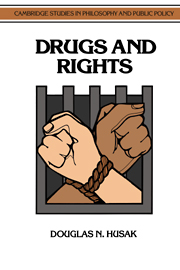2 - Drugs and harm to users
Published online by Cambridge University Press: 05 June 2012
Summary
In this chapter I will assess whether criminal laws against the recreational use of drugs (LAD) are justifiable on paternalistic grounds. In other words, I will evaluate attempts to defend or reject LAD solely because of the harm drugs cause to adult users themselves, quite apart from the harm they cause to nonusers. In Chapter 1,1 proposed that the strengths and weaknesses of the case for LAD are best revealed by distinguishing the harm drugs cause to users from the harm they cause to others. I explore the separate issue of whether LAD can be justified by a “harm to others” rationale in Chapter 3.
With increasing frequency, drug prohibitionists have cited so-called moral harms to users in support of LAD. After conceding that a cost-benefit analysis is inconclusive, James Q. Wilson maintains that “the moral reason for attempting to discourage drug use is that the heavy consumption of certain drugs is destructive of human character … The dignity, autonomy, and productivity of many users, already impaired by other problems, is destroyed.” In citing this rationale for the prohibition of illegal substances, Wilson echoes the sentiments of former drug czar William Bennett: “Drug use - especially heavy drug use - destroys human character. It destroys dignity and autonomy, it burns away the sense of responsibility, it subverts productivity, it makes a mockery of virtue.”
- Type
- Chapter
- Information
- Drugs and Rights , pp. 71 - 144Publisher: Cambridge University PressPrint publication year: 1992



